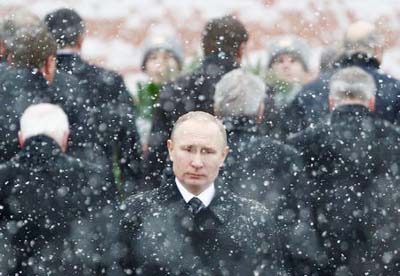
Reuters, Moscow :
Poised to run for a fourth term, President Vladimir Putin has started clearing out the old Russian political elite and says he’s bringing in young people with “fire in their eyes.”
But a Reuters analysis shows that he has made limited progress so far.
In the run up to March elections that are expected to hand him a mandate to stay in power until he is 70, Putin says he is promoting a new generation of officials to drive Russia’s economic and political future.
One fifth of the country’s 85 regional governors have been replaced this year and almost half of the lower house of parliament changed in elections last year after Putin brought in a new chief of staff. The Reuters analysis of political appointments shows, however, that in the cabinet, the upper house of parliament, the Security Council and the presidential administration, the pace of change has slowed and the average age is almost three years higher than when he began his third term in 2012.
Kremlin spokesman Dmitry Peskov declined to comment on the findings. He said it would take too long to check the data. With no change expected at the very top, critics say the lack of fresh blood translates into a dearth of fresh ideas to stimulate politics and the economy. “There are similarities with the era of (Soviet leader Leonid) Brezhnev in that we’ve fallen into a malign stability from which there’s no way out,” Dmitry Oreshkin, an independent political analyst, told Reuters.
Opposition protesters are fond of photoshopping Putin’s face onto Brezhnev’s torso on placards, implying that Putin and the system he has built is as stagnant as Brezhnev’s Soviet Union, a charge the Kremlin rejects.
“For Putin there are no risks because the system works and obeys him,” said Oreshkin. “The risks are for the country and the economy. The model of stability is underpinned by a system of loyalty and corruption. Outside Moscow, which is rich, there is stagnation.”
Weighed down by Western sanctions for its 2014 annexation of Ukraine’s Crimea and backing for a pro-Russian uprising in east Ukraine, the Russian economy, though recovering, remains fragile and vulnerable to oil fluctuations and new sanctions.
Poised to run for a fourth term, President Vladimir Putin has started clearing out the old Russian political elite and says he’s bringing in young people with “fire in their eyes.”
But a Reuters analysis shows that he has made limited progress so far.
In the run up to March elections that are expected to hand him a mandate to stay in power until he is 70, Putin says he is promoting a new generation of officials to drive Russia’s economic and political future.
One fifth of the country’s 85 regional governors have been replaced this year and almost half of the lower house of parliament changed in elections last year after Putin brought in a new chief of staff. The Reuters analysis of political appointments shows, however, that in the cabinet, the upper house of parliament, the Security Council and the presidential administration, the pace of change has slowed and the average age is almost three years higher than when he began his third term in 2012.
Kremlin spokesman Dmitry Peskov declined to comment on the findings. He said it would take too long to check the data. With no change expected at the very top, critics say the lack of fresh blood translates into a dearth of fresh ideas to stimulate politics and the economy. “There are similarities with the era of (Soviet leader Leonid) Brezhnev in that we’ve fallen into a malign stability from which there’s no way out,” Dmitry Oreshkin, an independent political analyst, told Reuters.
Opposition protesters are fond of photoshopping Putin’s face onto Brezhnev’s torso on placards, implying that Putin and the system he has built is as stagnant as Brezhnev’s Soviet Union, a charge the Kremlin rejects.
“For Putin there are no risks because the system works and obeys him,” said Oreshkin. “The risks are for the country and the economy. The model of stability is underpinned by a system of loyalty and corruption. Outside Moscow, which is rich, there is stagnation.”
Weighed down by Western sanctions for its 2014 annexation of Ukraine’s Crimea and backing for a pro-Russian uprising in east Ukraine, the Russian economy, though recovering, remains fragile and vulnerable to oil fluctuations and new sanctions.

